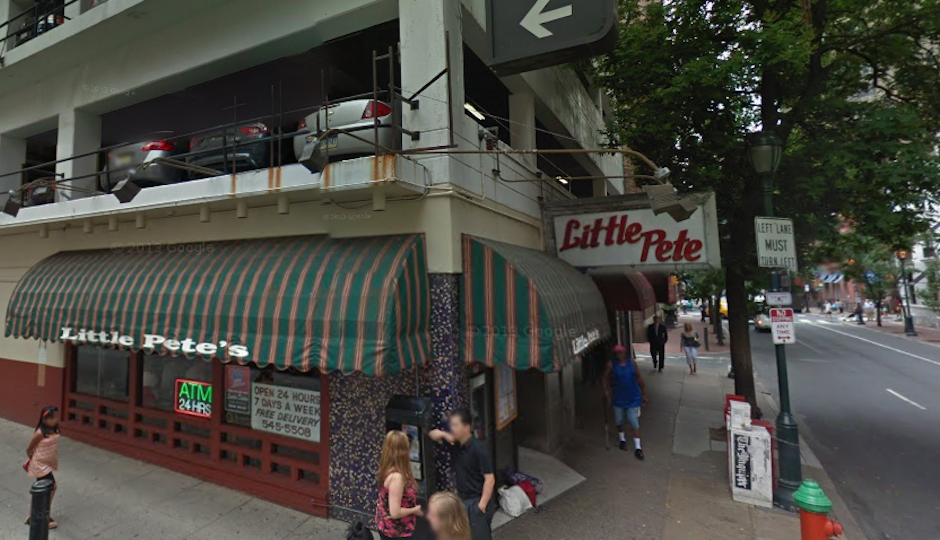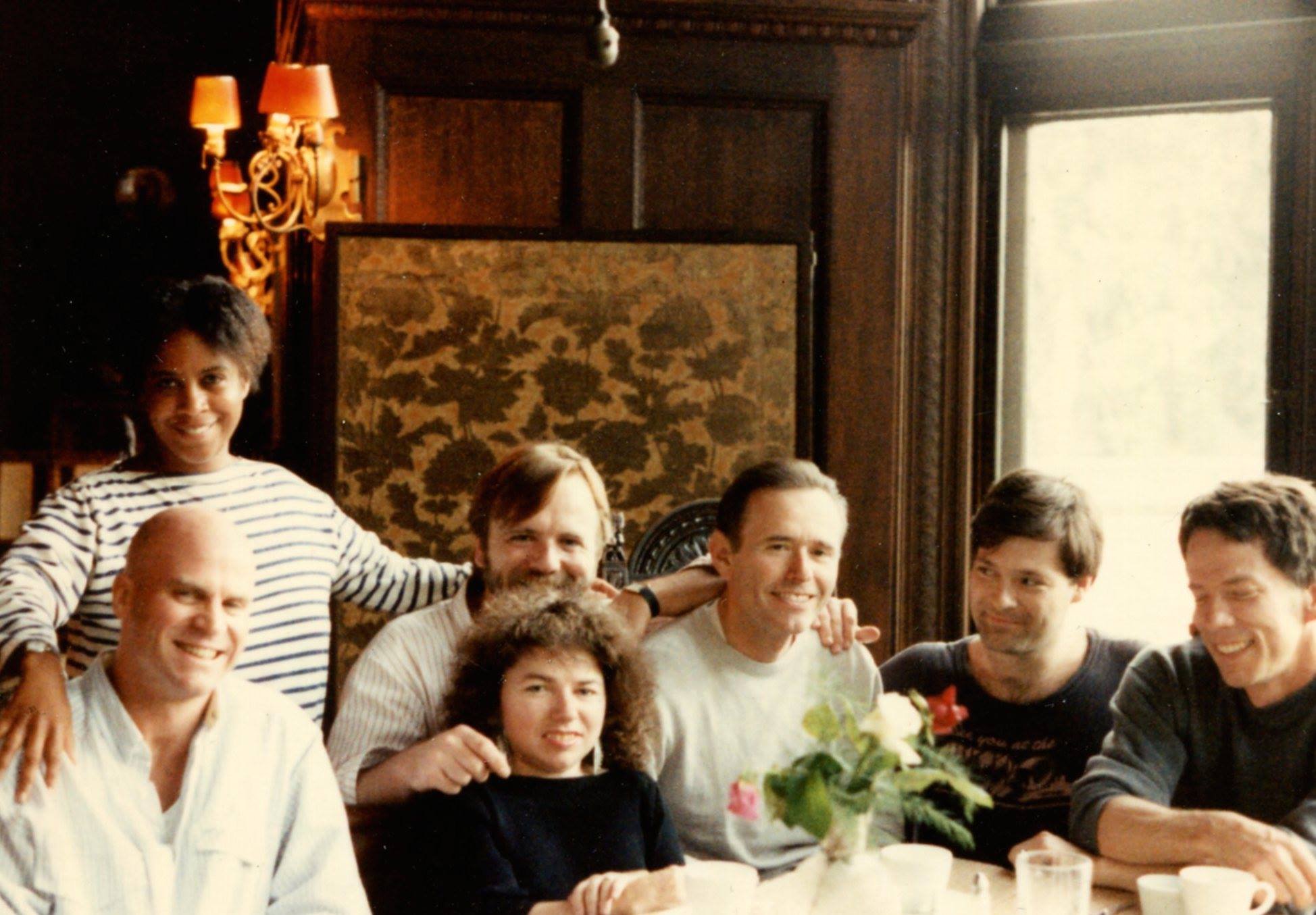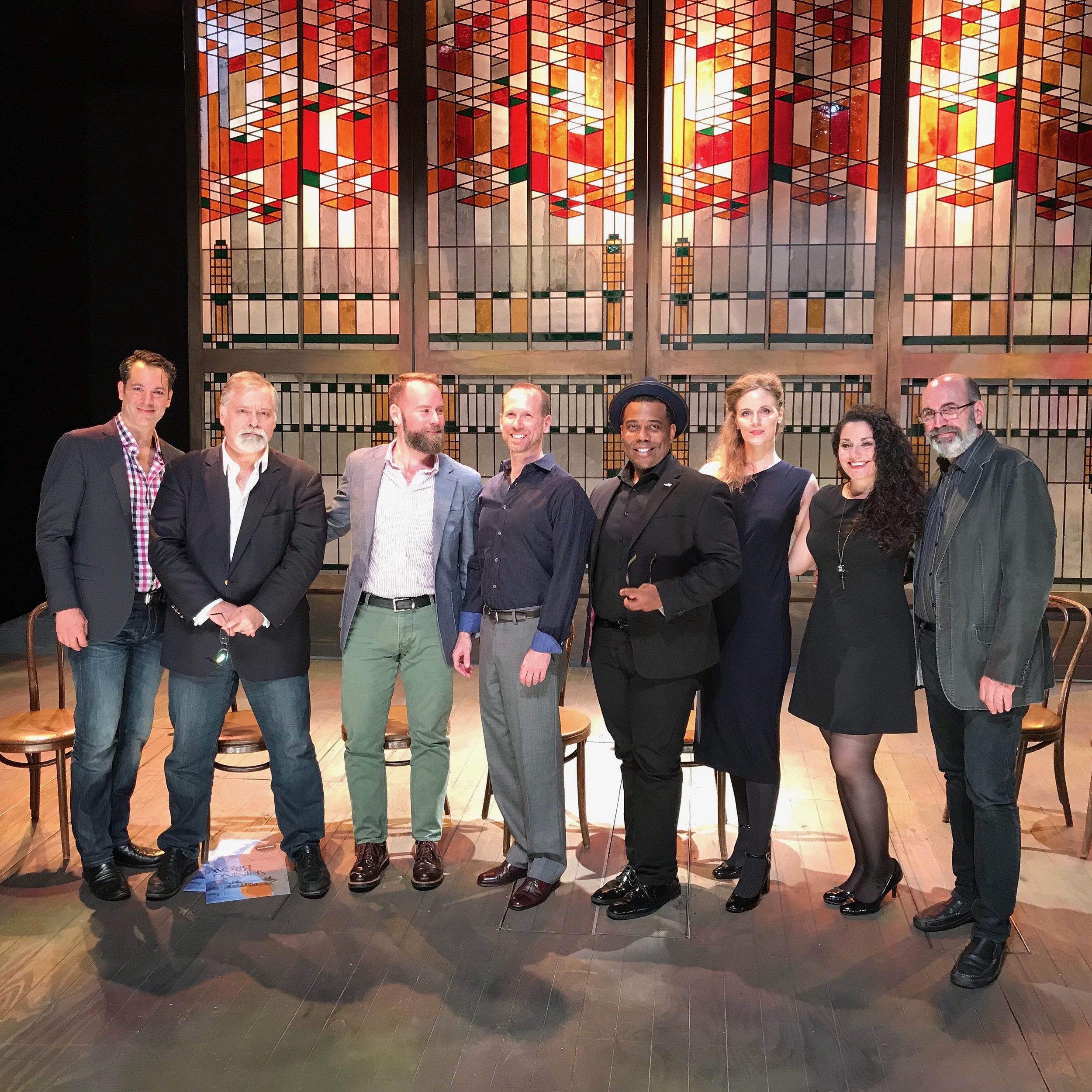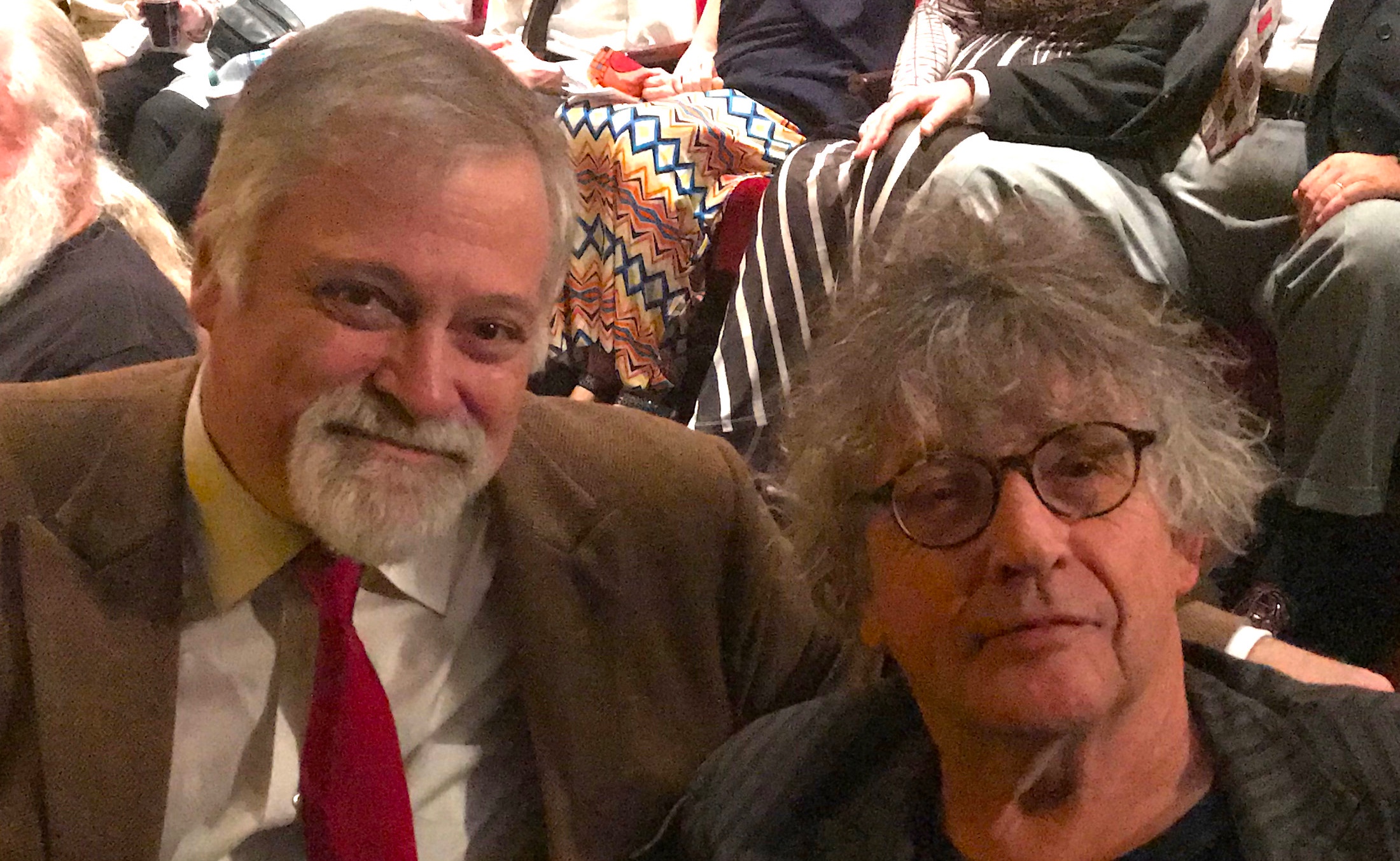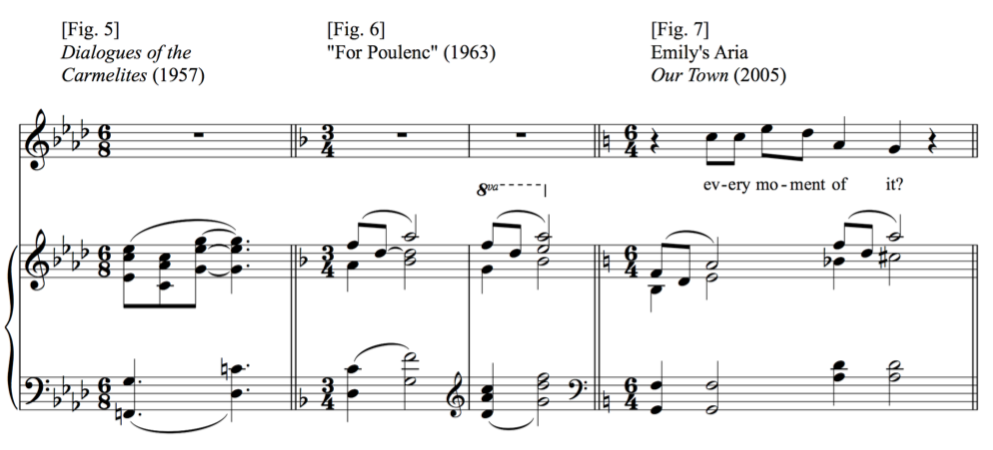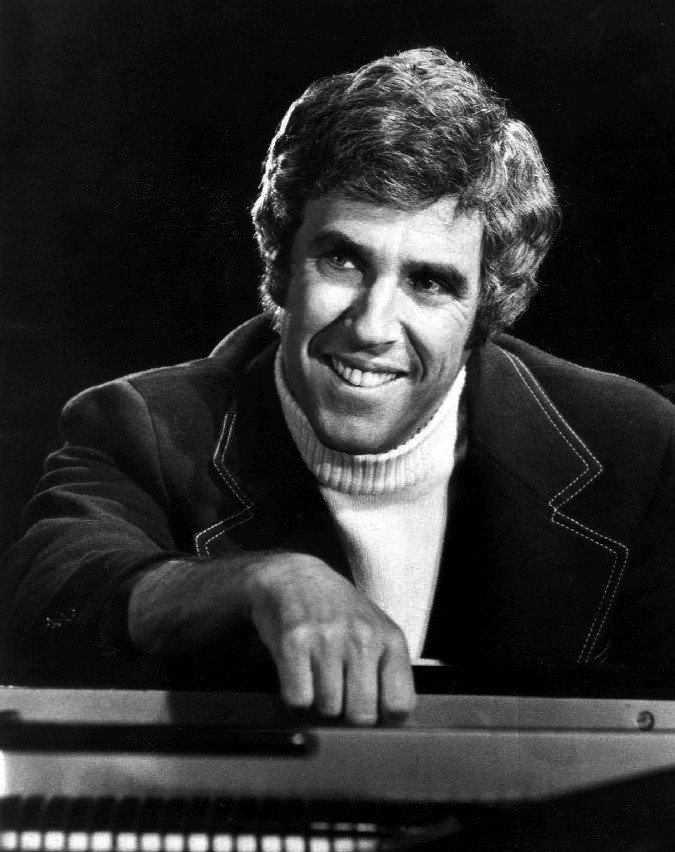Little Pete's Restaurant. Cash only. A Philadelphia treasure, in October 2014. (Photo: Daron Hagen)
Closure #1: OCTOBER 2014
This is a piece about Closure and the closure of Little Pete's, a belovéd greasy spoon across the street from the Warwick Hotel in Philadelphia. A wrecking ball is set to fly through Little Pete’s. Progress commands that a 300-room hotel must take the place of the parking ramp at 219 South 17th Street in whose corner nestles one of Center City Philadelphia’s treasures. We’re not talking Bookbinder’s (which is now, ignominiously, an Applebee's), chock full of tourists and overpriced, or the smattering of trendy boutique restaurants that surround Rittenhouse Square like hipsters lounging on the margins of a poetry reading. We’re talking about a Genuine 24-Hour Greasy Spoon, Home to Collars Both White and Blue, an Insomniac’s Oasis in the Night, a Caffeine Addict’s Last Resort, a Trusted Purveyor of that mysterious mélange of grill top odds-and-ends, Scrapple. We’re talking about Little Pete’s, for Pete’s sake. I'm afraid that the news is grim.
I’ll forever associate Little Pete’s with my youth, not just as a composer coming into his own, but also as a person whose world was opening up in one Big Bang. My life as it was then, almost impossibly full, was discussed, vivisected, celebrated, dreaded, and mourned at Little Pete’s.
Autumn 1981. This Wisconsin Boy, a tender nineteen years old, had only just moved to Philadelphia. The Grace of Whomever had handed me a lottery ticket in the form of an invitation to study at the legendary, preposterously intimidating Curtis Institute of Music. I was a Brooks Brothers shirt and blue jeans sort of guy. I grooved to Stockhausen more than Rorem, Berio more than Barber, and Bernstein even more than the Beatles.
Little Pete’s was the setting for countless post-lesson symposia. During my lessons, my mentor Ned Rorem casually dropped priceless aperçu and dry, acerbic criticisms while slashing through my compositions, his pencil waving this way and that like a rapier. Afterwards, a bit shell-shocked by the enormity of Ned’s self-assurance, my best friend, and fellow Rorem pupil Norman Stumpf, and I would head for Little Pete’s, where we would debrief. “Did he tell you that you succeeded in being boring?” I asked Norman, over Pete’s wretched, perennially burnt Joe, one afternoon. “Not this time,” Norman replied. “But he told me that William Flanagan wrote my song better in the late 50s.” “Who was he?” I asked. “That’s what I said,” replied Norman. I already knew what Ned’s answer had been: find out.
I didn’t yet have a telephone in my apartment. I’d use the payphone in Little Pete’s to call home for reports of my mother’s gradual submission to cancer back in Wisconsin, and then drink with a cellist friend until four or five in the morning, attempting to slake the thirst for silence in my head. I cannot recall how many dawns I greeted, my body still young enough to absorb the alcoholic gut punches dealt it during the previous hours, doing my counterpoint exercises at Pete’s lime green counter, “scrambled eggs and“ a few inches away, untouched, the dread of disappointing Ford Lallerstedt in class a few hours later by presenting mediocre work pulling me back from the edge.
I celebrated my first critical triumph as a composer at Little Pete’s; I also received my most gratuitous wing clipping by a music critic there. In 1983, the Philadelphia Inquirer’s august music critic, Daniel Webster gave my string orchestra work, Prayer for Peace, which William Smith had just premièred with the Philadelphia Orchestra, a glowing review in the paper. I’ll never forget my brother Kevin, who had come to town for the performance, spreading the newspaper on the table between us, skimming it before reading it to me, so that, if necessary, he could spare me the worst bits. Seventeen years later—a lifetime, really—my alma matercommissioned a piece to celebrate its 75th anniversary called Much Ado. Made careless by the standing ovation the piece had received the night before, I spread the Inquirer out on a table at Pete’s expecting at least a casual nod from the critic. Instead, my frothy showpiece was dealt a pasting. Composers do read reviews. Well, I used to—until that day, anyway.
I courted my girlfriend for months by walking her each day from Curtis to her train at Suburban Station. The day that she allowed me to carry her violin for her was the equivalent of moving from “vous” to “tu.” Afterwards, a little giddy, downcast, yet hopeful — the way you can be when you are in your early ‘20s and in love and have time and health and just enough money to get by, I bought the Daily News and the New York Times and worked my way through them at Pete’s until I felt the urge to compose percolate up within me like a welcome fever. Then, a man with a mission, I’d head for a practice room at Curtis and spread notes on music paper like jam on bread. God, that felt good. In time, the love affair sputtered. Music did not.
This morning, an old school chum posted the news on Facebook that Pete’s shall soon be no more. The comments following her post were lovely, and they’re still coming in. I shouldn’t be amazed by how much the place meant to all of us.
No more sentimental reveries over crab cake sandwiches when I return to Philadelphia for the occasional master class, performance, or lecture. One less skein of memory holding me to one of the few places on the planet, and one of the few times, when I was able to summon both the elegia of James Agee and the earnest and callow drive of Thomas Wolfe. “Aw,” a Philadelphia-based friend told me on the phone just now when I called him to confirm the news, “just drive on, old friend. It was inevitable. It had to happen. And it all began the day that they let people throw up buildings taller than William Penn’s hat.”
At "Little Pete's" on 27 February 2017. The restaurant got a reprieve, and is now scheduled to close in May 2017. (Photo by Neil Erickson)
Closure #2: February 2017
Fully three years after I first contributed the article above to the Huffington Post, still accepting "cash only," the diner holds on. The final closing date has been officially announced and accepted by management, and a steady stream of customers has been coming in to say goodbye for months, said the owner when I stopped in this morning.
Enough time has passed that the Warwick Hotel across the street has passed back into private hands and out of the clutches of the chain that had demolished its once elegant lobby and replaced it with a hideous, Euro-trashy, neon-blue fishtank affair.
My wife and I had checked into the Warwick the day before, our two sons in tow. I'd returned to Philly to hear a performance by the Chamber Orchestra of Philadelphia—Michael Ludwig had given a lovely account of the violin concerto I'd written for him a few years earlier. After Michael's vivid, glowing performance of my concerto with Dirk Brossé and the orchestra, I'd dined with my belovéd writing mentor (whom I'd first met as a student at Curtis in 1982) Emily Wallace and her husband Gregory and discussed my memoirs; I'd enjoyed a quick brunch with my good buddy, rising composer and Curtis faculty member David Ludwig, at Pete's the next morning. I'd even taken a moment to stretch my legs out before me in a favorite chair in the Common Room at Curtis for a few moments before walking to Little Pete's, spreading the Inquirer out on the green formica countertop, and reading a respectful review of my concerto by the same critic who had panned me all those years back.
June 2017. The original Little Pete's is literally no more. (Photo: Daron Hagen)
A few nights before, I'd sung my "Elegy for Ray Charles" at World Cafe Live in University City, a few blocks away, putting over my good friend Stephen Dunn's lovely words breathily into a hot mic and accompanying myself publicly in this town for the first time since the last time I touched the keys as the lounge pianist in the Barclay Hotel lobby in fall 1982. Then, I was about to make my Curtis debut, conducting my music with the Curtis Orchestra next door, Mother dying of cancer, my life just beginning. The other night, my wife and young sons sat at a nearby table. First, she took the stage and rocked the joint with a spiritual, and then rocked it again by singing the trumpet part(!) of Charles Ives' Unanswered Question in an arrangement by local composer Andrew Lipke.
Still ensconced at the Warwick, I was awakened of a February morning in 2017 by the sound of my son's voice: he was singing the trumpet solo of the Ives as he relieved himself in the bathroom. I knew at once that it would be a good day. After checking out, we celebrated by visiting Little Pete's a final time. The four of us squeezed into the booth in which I first sat during the early hours of a September morning in 1981 — the day I first hit the east coast — and ordered breakfast. The waitress who had presented me with a free piece of blueberry pie and said, "Welcome to Philly, honey," had long since passed away, and the boy I once was had become a man who can no longer eat most of what is on the menu. I couldn't resist introducing my eldest to the mysteries of Scrapple.
I love him anyway.
In Rittenhouse Square, May 2024.
Closure #3: May 2024
And now that boy is six inches taller than me, I think, barely registering the parking garage where Pete’s once stood as the two of us walk past it on our way to a rehearsal of his mother’s new piece, commissioned by the Esperanza Arts Center. David Ludwig is now dean and director of the music division at Juilliard; I now make “operafilms” and – after fourteen operas – I wonder if I’ll ever compose strictly for the stage again; I’ve never met the composers who teach at Curtis now and probably never will.
A child of about seventeen with a violin case strapped to their back tears westwards up Locust Street, presumably late for a rehearsal. I glance to my left as they pass and see my face reflected in the window of Michie’s, framed by the outline of a violin minus its front and back hanging like a feckless scarecrow by its neck among its siblings. We reach Rittenhouse Square, and my son reminds me that I used to tell him that there are Sycamore trees in heaven. I grab him by the shoulders and hug him tightly. “Let’s grab an Uber to Esperanza,” I exhale, “we don’t want to be late for your Mama’s rehearsal.”
Car arranged for; he immerses himself in his phone. It occurs to me that he is nearly the age I was when I lived in this place. The grace has settled in of having forgotten more about those years now than I can remember. I look up into the canopy at the watery May sunlight as it is filtered, coming from so very far away, through the brand-new leaves as we wait, and I feel entirely whole, entirely here, entirely at peace, as my old friend Rolland Flint once wrote, and which I finally understand, “resuming green.”
This essay originally appeared in its original form the Huffington Post on 31 October 2014. Click here to read it there.
